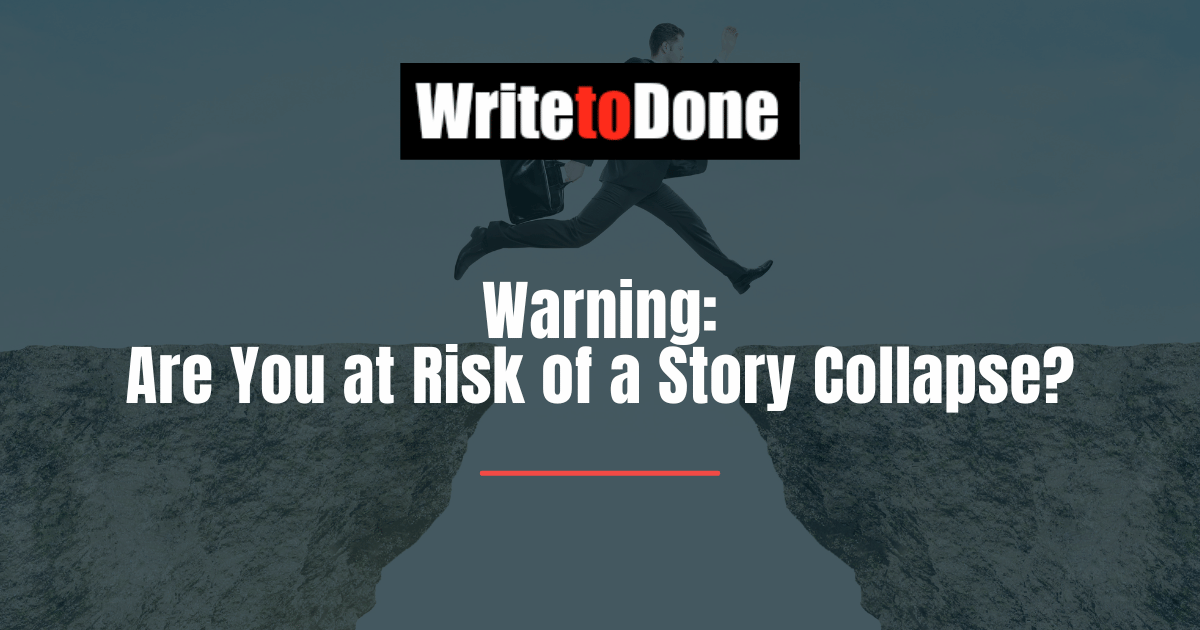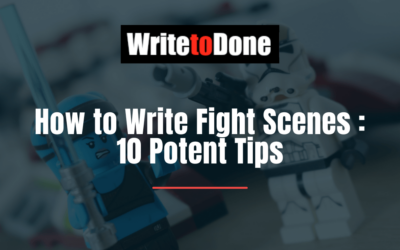Show of hands: Has this ever happened to you?
You are jamming away at your latest story.
Words are flowing. Characters come to life.
The realm you’ve created is awesome and infinite. You could live here the rest of your creative life. And then…
…it all stops.
Events that once unfolded faster than you could describe them screech to a halt. You have reached a precipice in your narrative and the footbridge across the chasm is wobbly and rickety.
Characters stare at one another mute, waiting for someone to speak. Armies stand idle on the hillside. Lovers wait by the phone. A detective scratches his head, shrugs his shoulders, then clocks out for the night.
Your story has stalled
Okay, you can all put your hands down.
Unless you are blessed with an innate sense of story structure (or a willingness to write stories that have no structure) you have almost certainly experienced a story collapse. It isn’t writer’s block. There’s nothing wrong with you. The problem is your story.
More accurately, the problem is your lack of story.
When a narrative collapses like a sit-com soufflé, the culprit is almost always an under-cooked plot. The universe may be terrific and the character’s compelling, but the plot isn’t complex enough to carry a reader (including you as your story’s first reader) beyond the initial discovery phase.
Think of the story as a dinner party. You get all dressed up and there’s a lot of stuff to experience: the location, the people, the catered finger-food, the fancy cocktails. There are old friends to catch up with and new people to meet.
In story terms, this is the discovery phase that happens in Act I. It’s all rather fun and entertaining, but eventually, you’ve caught up with everyone you like, avoided everyone you don’t, and had your fill of food and drink. Something else has to happen. That something else is Act II.
Too often writers will imagine a great dinner party and dive into writing before working out what happens next. And what happens next is the entire purpose of a story. So here are a few very basic questions that may help you build a nice bridge across the dreaded chasm of a story collapse.
1. Who is your hero?
This might be obvious.
Every story has a hero, right?
But take a moment to make sure you’ve made the right choice. The plot complications your story requires may not be possible with the character you’ve created.
A wealthy playboy wouldn’t have financial problems. Either you change the character or find a way to wreck his finances.
A clever detective would logically see through the killer’s subterfuge. Maybe that detective isn’t quite so clever.
A beautiful woman probably doesn’t have trouble getting dates. Maybe she needs an abrasive personality to generate logical plot complications.
Note: Plot complications often arise from character flaws.
Plot complications often arise from character flaws
2. What is your hero’s goal?
Every plotting book under the sun emphasizes the importance of a compelling goal. It may be the most important part of any story.
We all read stories, in part, to gain wisdom that helps us navigate our own lives. Either we are trying to gain something we lack (love, wealth, power), or preserve something that is under threat (our physical
Stories teach us how to do these things.
In short: A plot collapse may be due to a poorly defined goal.
A plot collapse may be due to a poorly defined goal
3. What stands in your hero’s way?
Obstacles. It’s all about obstacles.
A goal that is easy to achieve isn’t very interesting: “Pass the salt.” “Here you go.” “Thanks.” The End.
Stories typically involve really important events in a character’s life. Readers don’t need insight into easily achieved goals. We want help with the really difficult stuff. And that stuff is difficult because there are obstacles at every step of the journey.
The easiest way to bridge a narrative gap is to add more obstacles. If your lovers are falling in love too quickly, make one of them married…or a priest. If your detective is solving the murder too easily, take information away from him/her. Maybe they don’t have the victim’s identification. Maybe the likely perpetrator has an airtight alibi.
The best kinds of obstacles motivate your character to action. A hero trying to defeat a monster may require a special weapon (obstacle). They may have to consult a mentor to learn the location of that weapon (action). They may require a ship to reach that location (obstacle). They may need to recruit a crew to operate that ship (action).
In short: Count up the obstacles you’ve placed in your character’s path. Do you have enough obstacles to sustain your story? Does each obstacle force your hero to take action to reach that immediate goal?
4. What is your Death Moment?
This is another screenwriting trick--one so fundamental that they’ve become predictable--but every story can benefit from a Death Moment. In screenwriting, this is the point at the end of the Act II where the hero’s entire effort collapses. The lovers fight and break up. The warrior is defeated. The murderer gets away.
Knowing how your hero’s effort fail at the end of Act II can help define their plans at the beginning of Act II. Ask yourself what is the worst thing that could happen to your hero? Physical harm? Loss of money or reputation? Loss of love? That’s your death moment.
Now ask how that horrible fate comes to pass. What flaw in your hero leads to that event. Your warrior may be filled with hubris. Your detective may have broken the law to obtain a confession. Your lover may have lied about their past.
In short: knowing your death moment will help you lay the track to reach it.
Knowing the 'death moment' will help you create a coherent plot
And here is a final piece of advice to help avoid the dreaded collapse of a story: Start writing at the beginning of Act II.
Forget about all the fun new stuff about the dinner party. Don’t write about your hero getting dressed up, meeting people, and eating and drinking. Instead start your writing in the second act, where something happens at the dinner party. Maybe there’s a drunken fight, maybe lovers meet, maybe someone is murdered.
Start there.
If you can start blasting out words in your second act, then it’s a strong indication you have enough plot in place. If you can’t, then clearly you need to design a better plot. Don’t worry about the first act. It will be a breeze once the guts of the story are in place.
Please share this article on social media.
Insert your tweetable quote/phrase here


















